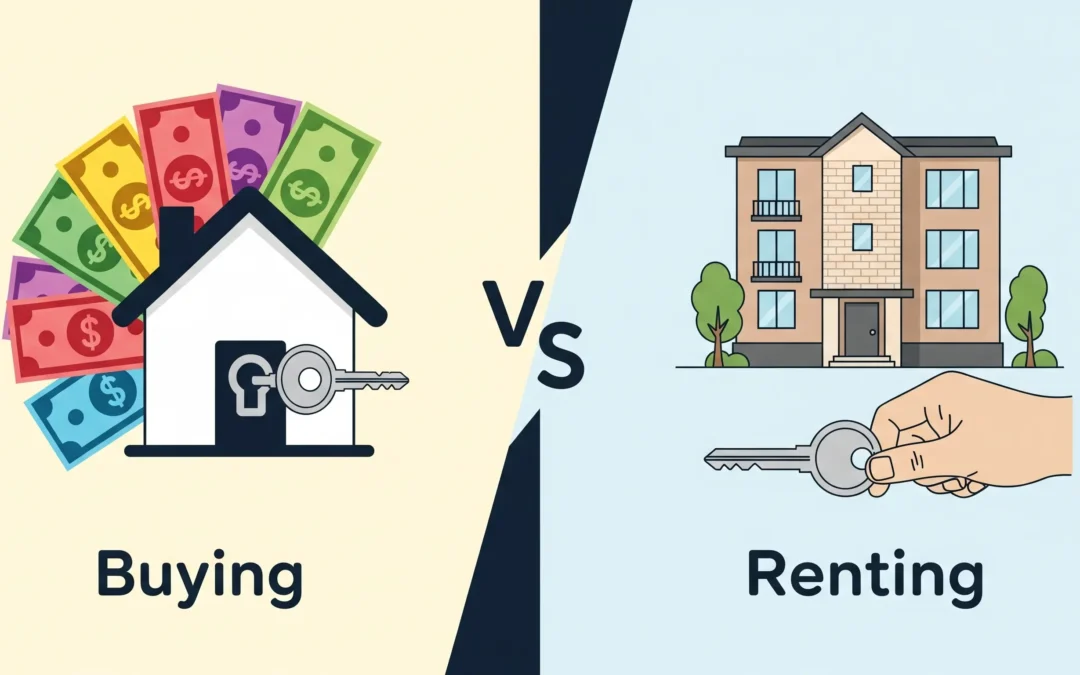Traditionally, owning a home has been regarded as a significant achievement that denotes long-term investment, security, and success. However, renting has become a flexible and frequently more sensible option in today’s dynamic world of rising real estate prices, job mobility, and shifting family structures.
The choice between buying and renting is important whether you’re a young professional assessing your first move, a family seeking long-term stability, or an individual nearing retirement and thinking about simplifying your lifestyle.
Examining expenses like EMIs versus rent, maintenance, property taxes, opportunity cost, tax benefits, and asset appreciation, this article delves deeply into the financial aspects of both options. By the end, you’ll know more clearly which course best suits your objectives, future plans, and financial status.
1. Initial and Ongoing Financial Investment in Home Purchase:
Buying a house:
- Typically, a down payment of 10% to 20% of the property’s value is required, depending on the property’s total value.
- In India, stamp duty and registration fees vary by state and range from roughly 5% to 7%.
- EMIs for home loans: 15–30 years of monthly payments.
- Property taxes and maintenance are ongoing costs.
Example:
| Cost Component | Amount (₹) – for a ₹60 Lakh home |
| Down Payment (20% of 60 lakh) | ₹12,00,000 |
| Stamp Duty & Charges | ₹3,60,000 |
| Monthly EMI (7.5% for 20 years) | ₹48,280 |
| Yearly Maintenance & Tax | ₹25,000–₹50,000 |
Renting a House:
Typically, renting calls for:
- Refundable security deposit: two to eleven months’ rent.
- Rent amount per month: Determined by property size and location.
- No ownership fees or long-term loan obligations.
Example:
| Cost Component | Amount (₹) |
| Security Deposit (3 months) | ₹54,000 |
| Monthly Rent | ₹18,000 |
| Annual Rent Hike (Avg.) | 5–10% |
2. Asset Building vs Flexibility
Advantages of Buying a House:
- Asset Appreciation: Over time, property values usually rise, particularly in urban or developing regions.
- Security & Stability: Ideal for long-term planning; no chance of being asked to leave.
- Customization: The ability to update and change your surroundings.
- Tax Benefits: For principal and interest repayment, under sections 80C and 24(b).
Advantages of Renting a House:
- Mobility: It is easy to relocate for work or to adapt to lifestyle changes.
- Reduced Financial Risk: No debt, particularly in the event that real estate values decline.
- Liquidity: Renting does not tie up your capital in property, allowing you to invest or use your funds elsewhere.
- No Upkeep Burden: The landlord is frequently responsible for repairs and maintenance.
3. Asset Appreciation vs Opportunity Cost
Although owning a home is frequently viewed as a means of accumulating wealth, it is important to take into account how the investment grows in comparison to alternative options.
Home Appreciation
Depending on location and infrastructure development, Indian real estate typically appreciates between 5 and 8% per year. At a 5% CAGR, a house worth ₹1 crore could increase to ₹1.6 crores in ten years.
Future Value=Present Value×(1+r)n
Where:
- Present Value = ₹1 crore (₹1,00,00,000)
- r = annual growth rate = 5% = 0.05
- n = number of years = 10
Future Value= ₹1,00,00,000 × (1+0.05)10
= ₹1,62,89,000
Opportunity Cost of Purchase
You could invest in stocks or mutual funds rather than putting down ₹20 lakhs. In ten years, ₹20 lakhs turns into ₹62.1 lakhs at 12% annual returns (equity markets).
| Scenario | After 10 Years |
| Property Appreciation (5%) | ₹1.63 crores |
| Investment in Equity (12%) | ₹62.1 lakhs (excluding rent paid) |
4. Factors related to flexibility, stability, and lifestyle
Financial considerations are important, but lifestyle choices also play a role. Both options bring in different aspects that one must look into.
Renting Offers:
- Mobility: Perfect for short-term visits, job transfers, or moving cities.
- No Long-Term Commitment: Ideal for recent graduates or people who aren’t sure they want to settle down.
Purchase Offers:
- Stability: Perfect for extended stays or families.
- Customization: The ability to redesign and renovate.
- Tax Benefits: Principal and interest payments are deductible under Sections 80C and 24(b).
Bottomline
Selecting between buying and renting is a strategic and personal choice in addition to a financial one. Another friend or family buying a house should not be the basis for the decision; rather, reflecting on need is important. Renting may be a better fit for your lifestyle if you seek flexibility, lower upfront costs, and the ability to move easily.
However, purchasing a home can be a profitable investment if you value long-term stability, asset creation and are ready to make the commitment. The option that best suits your present requirements, long-term objectives, and general financial health is the best one.


